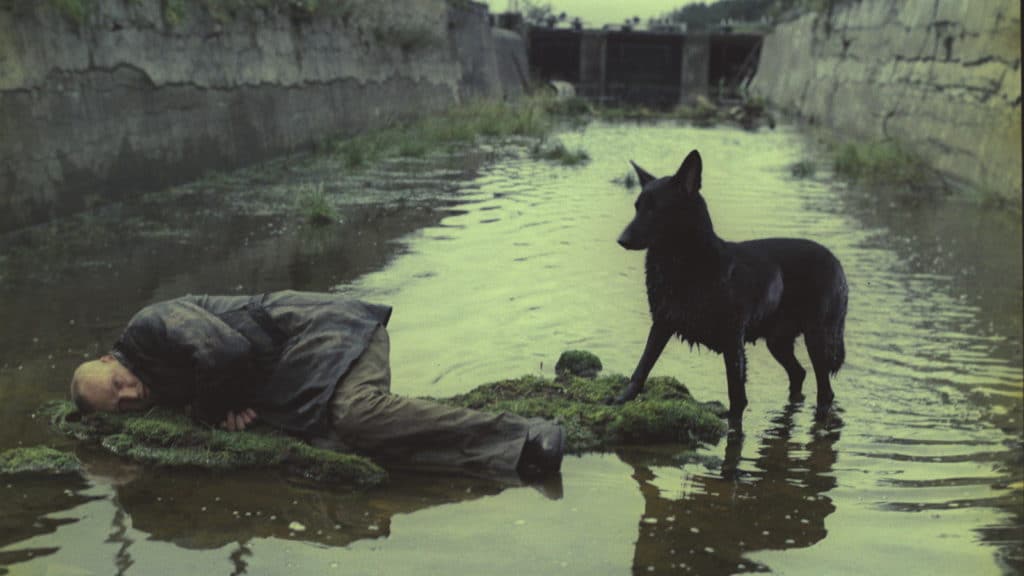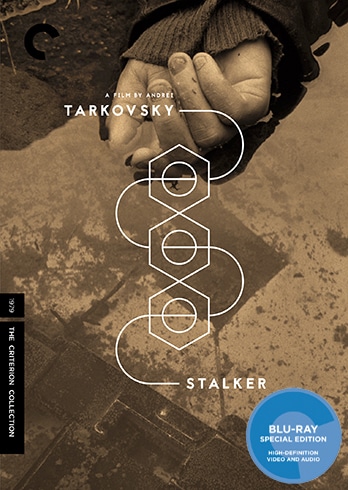I’ll be the first to admit that I’m woefully ignorant of the diverse cinema of the former Soviet Union; this goes even for those filmmakers who bridged that East/West divide, such as the best-known of the bunch, I’d say, Andrei Tarkovsky. Stalker (1979) is the first of his films that I’ve ever seen and, yep, I’m afraid that goes for Solaris too. Now, as to whether Stalker is the best starting point remains to be seen; it’s certainly a challenging film, and I can’t help but think that the ‘sci-fi’ tag attached to it may do it a disservice in some respects. When we think of science fiction, we think of the visible presence of the improbable. In Tarkovsky’s work, the improbable is there as context only, and there are no flashy effects or plot developments after the framework is established.
The film begins in a dank, dour apartment with a family – father, mother and child – sharing one bed. Medicines and syringes adorn a nearby table. Dad (Aleksandr Kaydanovskiy) is looking with affection upon his sleeping daughter, but relations between him and his wife seem strained, to say the least: he tries to sneak away, presumably for some sort of employment, but Zhena (Alisa Freindlikh) is angry, doesn’t want him to leave and winds up inconsolably weeping on the floor. It turns out that his employment is that of a ‘stalker’. These people lead others into a mysterious part of the landscape known as the Zone. The Zone simply…appeared one day: some believe that it was the result of an asteroid, some say it was the work of some sort of extraterrestrial intelligence. Soldiers sent to this region disappeared and so, to try to safeguard others, the authorities erected a guarded cordon around it, making it intensely dangerous for anyone to sneak in. Stalkers help people get in – and they do so because it transpires that within the Zone, there exists the potential to make one’s heart’s desires come true.
 Together with two other men – known only as ‘The Professor’ and ‘The Writer’ – the stalker takes them through deserted, waterlogged streets and nearer to their destination, avoiding gunfire along the way. The further they go, the more the landscape seems to be post-apocalyptic in some way; everything is broken, or derelict. Absolutely everything is flooded. The route is dangerous, they are low on resources and the soldiers keep up their assault on them, but eventually, they are able to reach the outskirts of the Zone.
Together with two other men – known only as ‘The Professor’ and ‘The Writer’ – the stalker takes them through deserted, waterlogged streets and nearer to their destination, avoiding gunfire along the way. The further they go, the more the landscape seems to be post-apocalyptic in some way; everything is broken, or derelict. Absolutely everything is flooded. The route is dangerous, they are low on resources and the soldiers keep up their assault on them, but eventually, they are able to reach the outskirts of the Zone.
Here, the palette changes from sepia to colour. This new area is a lush, but still a war-scarred place, and the stalker insists that they cannot simply walk straight to their destination – somewhere known as the Room. He tells the two others that the whole place is rigged with traps to keep people away, and that they must tread very, very carefully. Many people have, he insists, perished, right on the threshold of the Room. They must go cautiously, and they must also wait, and wait, for the right time to move on.
These three men – although acquaintances at best, rather than friends – spend a great deal of the rest of the film philosophising and pondering just what it is that they want from this ‘Room’. This futile hankering after something unknown has nothing in common with any of the sci-fi I could mention; if anything, this is Waiting for Godot with a science fiction back-story. It’s also similar to Godot in that these similarly, broken, shabby men are hanging around waiting for something which is a possible means through dissatisfaction and hardship, but they don’t really know what this relief will look like when they find it. And, as they don’t know what it looks like, they don’t really know how to progress. Stalker is incredibly oblique, and although there is some intimation of a tricksy intelligence which is keeping them all from what they want, this film is otherwise a long digression on the meaning of life which will, I am sure, test the patience of many viewers. I’d say you would need to have your appreciation of art-house in the ascendant, far more so than any lingering love for sci-fi or indeed any other genre, in order to enjoy this film (which, at a testing two hours forty minutes, may turn out to be rather important…)
 Being art-house orientated, Stalker successfully looks very striking indeed, positioning its characters against abandoned places and post-War bunkers (the film was shot on location in Russia and Estonia, each of which still bore the marks of conflict, even in the 1970s.) It also boasts a painterly approach, with lingering shots, creative uses of colour and a camera which deviates from the inner turmoil of the three men to pan over interesting, and clearly composed tableaux of potentially symbolic objects. Stalker is massively lo-fi, however, with an emphasis on rather cerebral dialogue about ‘the meaning of it all’ and an appropriately obtuse Soviet conclusion where we learn only not to ask again in future. La La Land, this categorically ain’t.
Being art-house orientated, Stalker successfully looks very striking indeed, positioning its characters against abandoned places and post-War bunkers (the film was shot on location in Russia and Estonia, each of which still bore the marks of conflict, even in the 1970s.) It also boasts a painterly approach, with lingering shots, creative uses of colour and a camera which deviates from the inner turmoil of the three men to pan over interesting, and clearly composed tableaux of potentially symbolic objects. Stalker is massively lo-fi, however, with an emphasis on rather cerebral dialogue about ‘the meaning of it all’ and an appropriately obtuse Soviet conclusion where we learn only not to ask again in future. La La Land, this categorically ain’t.
So – as a first expedition with Tarkovsky, this was admittedly a challenge for me. Stalker is a strange, hypnotic and well-soundscaped creative enterprise, for sure, as well as being quite unlike anything else I’ve seen (apart from, as mentioned, a certain play by a certain Beckett) but it’s also dreary and motionless for much of the time, a chance to peer through the undergrowth and dereliction at some troubled souls without really being able to see any of them through their plight. I guess this is kind of the point. Should you wish to pick this one up, then, the Criterion Collection are about to issue a special edition which boasts a new digital restoration and a crop of special features.
Stalker will be released on 24th July 2017.
